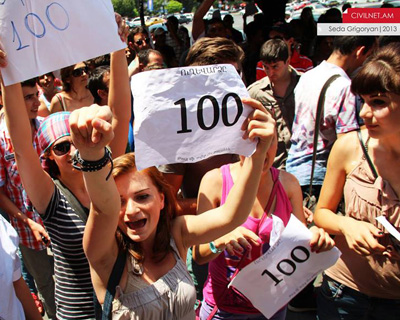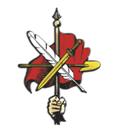 Yerevan’s Bus Fare Protests: A Timeline
Yerevan’s Bus Fare Protests: A Timeline
July 18: Fares for public transportation by bus or minibus are scheduled to increase from 100 to 150 dram. The owners of 48 companies operating privatized transportation routes had filed petitions with the Yerevan municipality to increase the fares, citing high maintenance costs and price increases in liquefied gas imported from Russia, which is used to fuel minibuses. Electric trolley bus routes, favored by senior citizens because of the cheaper fare, will also go up from 50 to 100 dram. The fare hike is the first in well over a decade. The announcement is made by Henrik Navasardyan, head of the Yerevan Municipality’s Department of Transportation.
July 19: Young activists protesting against the slated price increase congregate in front of Yerevan City Hall. Protesters at one point are seen throwing 50-dram coins in the direction of the main entrance, which is heavily guarded by policemen. One coin accidentally lands on the head of Mayoral Advisor Albert Gevorgyan while he is talking to journalists.
July 20: The new fare prices go into effect. Three young activists, Davit Haroutyunyan, Sona Msryan, and Arsen Ohanyan, are detained for passing out flyers that call on commuters to refuse to pay the new fare. At bus stops, protesters tape flyers to the windshields and windows of buses instructing people to continue paying the 100-dram fares. They also hand them out to passengers when buses pull up at bus stops. Announcements are made with bullhorns urging citizens to continue paying the same fare. Activists claim that the new fares are unjustified since the bus routes are owned by government officials or individuals with close ties to the government, and are thus lucrative businesses.
July 22: The citywide protests continue to gain followers. More activists are detained. Celebrities who sympathize with the movement begin offering free rides to people waiting at bus stops. Bus drivers continue to accept the 100-dram fares, some begrudgingly, as reports of quarrels with passengers come online. The social media, specifically Facebook, is being used as a main channel for creating awareness and disseminating information about the situation on the ground.
July 23: Protesters face resistance from riot police, and six more activists are detained. They are released shortly after hundreds of people swarm in front of the police headquarters. Small protests continue at bus stops throughout the city center. Meanwhile, Hetq Online publishes an article claiming that Navasardyan owns a Yerevan bus route, and that one of his sons runs a company that sells advertising space on public transportation vehicles. The news story stirs even more controversy and outrage.
The movement’s name, “I Will Only Pay 100 Dram,” is revealed with the announcement of a rally scheduled at Mashtots Park—a symbolic site of civic protest.
July 24: An innovative carpooling initiative goes online on a new website called freecar.am, where motorists who have spare seating offer their services to people who cannot afford to pay the new fares. (As of July 28, 269 drivers have signed up.)
Karen Andreasyan, an Armenian human rights defender, in a statement putting pressure on Yerevan Mayor Taron Markaryan, says that the price hike is unjustifiable without public debates and a signed order by the mayor instating the new fare. Markaryan himself announces that he signed the order on July 19, only one day before the new fare price went into effect. Per Armenian law, it is illegal to put new directives into force without prior notice.
Purported overtures made by the Heritage and Prosperous Armenia Parties to lend sponsored support to the movement are rejected by its leaders.
July 25: In a move signaling the understanding that the civic movement has no political undertones, Prime Minister Tigran Sargsyan—during opening remarks of a meeting with his cabinet—hails the initiative, stating that civil society is taking shape and the government must do more to address public concern.
Activists continue their protests unabated. Some are seen in Republic Square distributing flyers printed with articles on public transportation per Armenian law.
Just before 6 p.m., Mayor Markaryan announces that he is temporarily suspending the fare hike, but makes no mention of when prices may increase in the future. Hundreds of activists take to the streets in celebration, marching through Liberty Square and down Mashtots Street, the tricolor in hand.
July 26: Activists continue to congregate en masse in front of Yerevan City Hall, calling for the dismissal of Navasardyan and Misak Hambardzoumyan, the director of Yerevan Trans Ltd., a transportation operator. They are met by a persistent wall of police, but remain peaceful. Activists also demand that commuters obliged to pay the higher fare over the last week be reimbursed.
July 27: A sit-in protest continues in the evening at Yerevan City Hall, where activists strategize to determine the direction the movement will take. A similar gathering is held at Mashtots Park.
“Taron, Liar. Taron, Cheater”
On July 22, at the initiative of ARF-D Youth and Student organizations, citizens gathered in front of the Yerevan municipality building to protest against the rising of transportation fare. The crowd shouted “Taron, liar. Taron, cheater” addressing mayor Taron Margaryan and referring to his previously made statements about not increasing the bus fare. After reading their list of demands, the protesters handed it to Albert Gevorgyan, an adviser to the mayor.
ARF-D Supreme Council of Armenia Chairman, Armen Rustamyan was also present in support of the protesters who called the political parties of the Yerevan Elderly Council (municipal) to join them. The protesters marked that the decision to raise transportation fare was illegal. Rustamyan suggested to municipality representatives to form an investigative commission that will look into the mayor Margaryan’s decision.
ARF-D Demands End to Bus Fare Hike
YEREVAN—The Armenian Revolutionary Federation Supreme Council of Armenia on Monday issued a statement condemning a decision by Yerevan city government to increase prices of public transportation in the city by 50 percent. Below is the English translated text of the announcement.
A RF-D Supreme Council of Armenia condemns the unsubstantiated 50 percent increase in the price of public transportation by the government. This step is unacceptable by political, economic, social and legal perspectives.
RF-D Supreme Council of Armenia condemns the unsubstantiated 50 percent increase in the price of public transportation by the government. This step is unacceptable by political, economic, social and legal perspectives.
During the election campaign, the authorities were promising that there would not be an abrupt increase in prices and were pledging real growth in quality of life. However, after the elections, price increases in gas, electricity and other basic essentials were followed by the public transportation fare hikes. Once gain they deceived the public, creating an atmosphere of mistrust in the future and a sense of being not protected.
The explanation by officials that increase in gas and electricity prices are not connected to the fare hike is illogical. If that assertion is true then the government is running a policy that advances the interests of a few over the needs of the public. If the assertion is false, then the authorities are, once again, deceiving the public and experts in the field by stating the increase in gas and electricity prices will result in only a 2.7 percent inflation. In both instances, the political leadership is operating to the detriment of society.
From a socio-economic perspective, this step by the political leadership contradicts international norms and practices where competition is the best indicator of price setting. However, in the public transportation sphere, for example the administration of the trolley lines, a system marrying political and economic interests has become a monopoly of influential people. International norms have shown that prior to or immediately following an objective increase of prices the there is national increase on wages. Such a thing has not taken place in Armenia. The best examples from international experience are plans that feature multiple rates, discount plans, transportation cooperatives and the execution of bundled transportation tickets, which financially enhance the transportation system, enlarge public oversight, increase the flow of passengers and make rates affordable.
Thus, the ARF-D Supreme Council of Armenia:
1. Condemns the Armenian government’s shortsighted policies;
2. Demands that the decision to increase public transportation prices be halted and any fare increases be carried out through a transparent mechanism corresponding to the increase of wages;
3. Suggests the establishment of a public-expert group, to develop and propose a legal-collective system that includes multiple rate plans, discount systems, formation of transportation cooperatives;
4. Welcomes and expresses it solidarity with those groups and youth who are expressing their anger at this disgraceful decision and through their activism are defending their and the public’s rights.
ARF-D Supreme Council of Armenia
July 22, 2013







